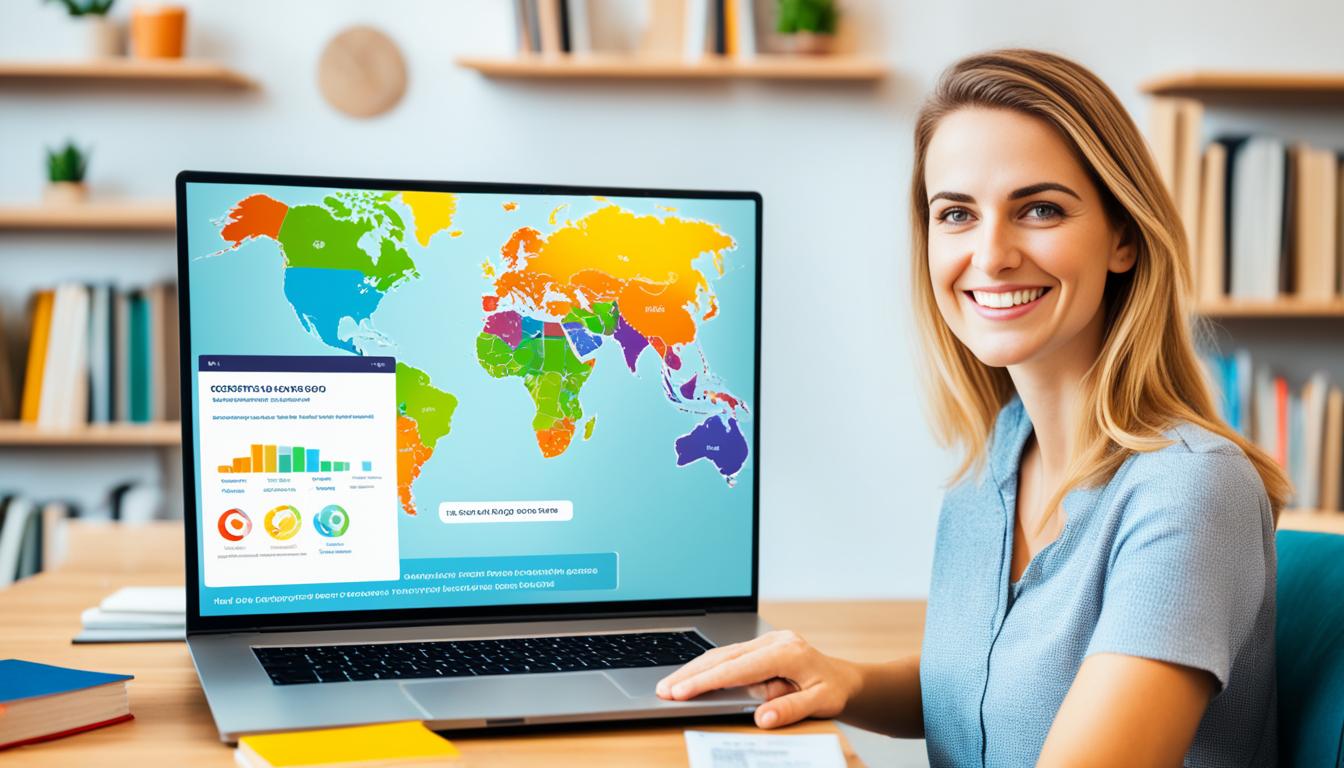In today’s fast-paced world, the realm of education has transformed to embrace the digital age. With the advent of online education, a whole new world of opportunities has opened up for learners of all ages. Digital learning platforms, continuing education programs, and distance learning opportunities have revolutionized the way we acquire knowledge and develop new skills.
Virtual classrooms provide a conducive environment for interactive learning, where students can engage with instructors and peers from around the globe. These web-based education platforms offer a myriad of online learning resources, ranging from comprehensive course catalogs to interactive tools that enhance the learning experience. The flexible nature of online education allows individuals to access a wealth of information and educational programs at their own convenience, breaking down the barriers of time and location.
Key Takeaways:
- Online education offers a flexible and convenient way to acquire knowledge and skills.
- Digital learning platforms provide access to a wealth of online resources and course catalogs.
- Virtual classrooms enable learners to connect with instructors and peers from all over the world.
- Distance learning opportunities overcome the limitations of time and location.
- Continuing education programs empower individuals to expand their horizons and embrace lifelong learning.
Overcoming Geographical Obstacles in Online Education
The potential of virtual events in online education to transcend geographical boundaries is one of its significant advantages. Students and educators can connect from anywhere in the world, expanding the pool of participants and promoting a multicultural and international learning environment. Virtual events enable students to collaborate with peers from diverse backgrounds, fostering a more inclusive educational experience. This global connectivity breaks down barriers and allows for a rich exchange of ideas and perspectives, broadening horizons for all involved.
“Virtual events in online education provide a unique opportunity for students to connect and learn from individuals all over the globe. By leveraging technology, we can bridge the geographical divide and create an inclusive learning environment where students can exchange ideas and cultures, fostering a truly enriching educational experience.” – Dr. Emily Thompson, Education Specialist
Connecting Students Worldwide
Through virtual events, online education platforms facilitate connections between students worldwide. Regardless of their location, individuals can engage in collaborative projects, discussions, and group activities. This global connectivity not only enhances the learning experience but also exposes students to diverse perspectives and ideas.
Inclusive Learning Environment
Online education fosters an inclusive learning environment by breaking down barriers such as physical distance or cultural differences. Virtual events offer students the opportunity to interact with peers from various backgrounds, encouraging the exchange of ideas and the development of cultural understanding and empathy.
Multicultural Learning
Virtual events in online education expose students to multicultural learning experiences. By collaborating with peers from different countries and cultures, students gain insights into diverse perspectives, customs, and traditions. This multicultural learning environment promotes tolerance, global awareness, and the development of cross-cultural communication skills.
Exchange of Ideas and Perspectives
Online education platforms facilitate the exchange of ideas and perspectives on a global scale. Through virtual events, students can engage in discussions, present their research, and share their unique insights with peers from around the world. This exchange of ideas broadens perspectives and fosters critical thinking and creativity.
| Benefits | Description |
|---|---|
| Inclusive learning environment | Virtual events promote inclusivity by connecting students from diverse backgrounds and cultures. |
| Global connectivity | Online education provides a platform to connect and collaborate with students worldwide. |
| Multicultural learning | Through virtual events, students gain exposure to diverse perspectives, cultures, and customs. |
| Exchange of ideas and perspectives | Virtual events facilitate the sharing of insights and the exploration of different viewpoints. |
Collaboration and Inclusive Education
In online education, collaboration among students and creating an inclusive learning environment are highly beneficial. Collaborating with peers allows students to gain different perspectives and insights, broadening their understanding of the subject matter.
Engaging students from diverse backgrounds and experiences fosters teamwork and cooperation skills, preparing them for real-world scenarios where collaboration is essential. This interactive learning approach promotes understanding, empathy, and respect for others, cultivating a supportive and inclusive learning environment.
“Coming together is a beginning; keeping together is progress; working together is success.” – Henry Ford
The benefits of collaboration in online education extend beyond academic achievement. By working together on group projects, students develop critical thinking and problem-solving skills, enhancing their ability to think creatively and innovatively. This collective problem-solving encourages students to explore new ideas, challenge existing concepts, and develop solutions that are both effective and original.
“Alone, we can do so little; together, we can do so much.” – Helen Keller
Supportive Learning Environment
A supportive learning environment is crucial in fostering collaboration and inclusive education. It nurtures a sense of belonging and encourages students to express their ideas freely. In such an environment, students feel valued, respected, and comfortable sharing their thoughts and perspectives.
When students feel supported by their peers and educators, they are more likely to engage actively in discussions, ask questions, and seek assistance when needed. This type of inclusive environment promotes a positive learning experience for all students involved.
“In diversity, there is beauty, and there is strength.” – Maya Angelou
In conclusion, collaboration and a focus on building an inclusive learning environment are integral to the success of online education. Through collaboration, students gain different perspectives, develop essential skills, and foster creativity and innovation. A supportive learning environment ensures that every student feels valued, respected, and empowered to contribute their unique insights. By embracing these principles, online education can provide a transformative and holistic educational experience.

Access to Expertise in Online Education
Industry professionals, subject matter experts, and guest speakers bring invaluable real-world perspectives to online education, enhancing the curriculum and providing students with practical skills. Through interactions with these experts, students gain insights into current trends, best practices, and emerging technologies in their chosen fields.
By tapping into the expertise of industry professionals and subject matter experts, online education goes beyond the confines of traditional classrooms, providing a unique learning experience. The input and guidance from these experts help students navigate the professional landscape and develop the skills needed to succeed in their future careers.
Virtual learning events offer students the opportunity to connect directly with professionals actively working in their fields of interest. These events provide students with valuable industry insights and networking opportunities, fostering meaningful connections that can pave the way to future career opportunities.

The Benefits of Industry Professionals and Subject Matter Experts
- Real-world perspectives that enrich the curriculum
- Deeper understanding of students’ areas of study
- Insights into current trends and emerging technologies
- Practical skills development
- Guidance for navigating the professional landscape
Virtual Learning Events and Networking Opportunities
Students have the unique opportunity to participate in virtual learning events where they can connect with industry professionals and subject matter experts. These events provide networking opportunities and valuable industry insights, further enhancing the online education experience.
Enhancing the Curriculum with Real-World Perspectives
“Interacting with industry professionals and subject matter experts adds a practical dimension to the curriculum. Their real-world experiences bring to life the theories and concepts learned in the online classroom, enabling students to engage with the material in a more meaningful way.”
Developing Practical Skills for Future Success
“Industry professionals and subject matter experts guide students in developing practical skills that are essential for success in their future careers. By incorporating real-world perspectives and practical applications, online education equips students with the skills they need to thrive in their chosen fields.”
Enriching Learning Resources in Online Education
In the realm of online education, the availability of diverse learning resources presented through virtual events is unparalleled. Students gain access to a wealth of opportunities including webinars, workshops, online conferences, and virtual field trips, which extend their learning beyond the confines of a traditional classroom setting.
Through webinars, students can participate in interactive sessions with subject matter experts, diving deeper into specific topics of interest. These engaging online sessions foster a dynamic and immersive learning experience that encourages active participation and knowledge retention. With workshops, students have the chance to acquire hands-on skills and practical knowledge, honing their abilities in a variety of disciplines. The collaborative nature of workshops further enhances the learning process by promoting teamwork and cooperation.
Online conferences provide a platform for students to engage with experts and peers from around the world. These virtual gatherings allow for the exchange of ideas and insights, facilitating valuable discussions and fostering a sense of global community. Students gain exposure to a diverse range of perspectives, broadening their understanding and encouraging critical thinking.
In addition to webinars, workshops, and conferences, virtual field trips offer students a unique way to explore new environments and gain real-world insights. Through virtual tours of museums, historical sites, and scientific expeditions, students can immerse themselves in educational experiences that might otherwise be inaccessible. The visual and interactive nature of virtual field trips creates an engaging learning environment that stimulates curiosity and encourages active exploration.
Online education platforms also provide a wealth of educational content tailored to various learning styles and preferences. These platforms curate a vast array of resources such as articles, videos, e-books, and interactive tutorials, providing students with a rich and diverse collection of material to supplement their studies. The availability of such diverse resources empowers students to embrace a personalized approach to learning, enabling them to delve deeper into their interests and cultivate a comprehensive understanding of the subjects they are passionate about.
Virtual Field Trips – Exploring the World from Home
One particularly captivating resource in online education is virtual field trips, offering students the opportunity to explore destinations and gain real-world experiences, all from the comfort of their own homes. Through stunning visuals, immersive videos, and interactive features, virtual field trips transport students to far-off locations, historical landmarks, and scientific discoveries. Whether it’s embarking on a virtual safari, diving into the depths of the ocean, or traversing the ancient ruins of a civilization, virtual field trips bring learning to life in a truly captivating and engaging way.
Virtual field trips not only foster a deeper understanding of different cultures, environments, and historical events but also ignite students’ curiosity and stimulate their desire to learn beyond the confines of a textbook. By offering students the chance to explore the world from their screens, virtual field trips broaden their horizons, encourage global awareness, and inspire a sense of wonder.
The Power of Interactive Learning
One of the key benefits of online education is the ability to engage students through interactive learning experiences. These experiences can range from simulations, virtual laboratories, and gamified lessons to collaborative group activities and discussions. By actively involving students in the learning process, interactive activities promote critical thinking, problem-solving skills, and knowledge retention.
Interactive learning provides students with a more dynamic and engaging approach to education, fostering curiosity, creativity, and a deeper understanding of the subject matter.
Diverse Resources for Diverse Learners
Recognizing that students have varied learning styles and preferences, online education platforms strive to provide diverse resources to cater to individual needs. Whether it’s visual learners who benefit from videos and infographics, auditory learners who thrive through podcasts and lectures, or kinesthetic learners who engage with hands-on activities, online platforms offer a wide range of resources to accommodate different learning preferences.
Moreover, the diverse selection of resources ensures that students can access materials that align with their interests and passions, fostering a sense of ownership and autonomy in their educational journey.
Overall, the enriched learning resources available in online education, including webinars, workshops, conferences, virtual field trips, and a variety of educational content, open up new avenues for students to explore, engage, and excel in their education.
Conclusion
Elevating your educational experience begins with embracing the core features that define modern Learning Management Systems (LMS). These innovative platforms revolutionize traditional education, enabling flexible, engaging, and personalized learning.
Cloud-based delivery is a key feature of modern LMS, allowing seamless access to educational resources anytime, anywhere. This accessibility fosters a flexible learning experience, catering to diverse schedules and individual needs. Additionally, cloud-based delivery ensures that educational materials are constantly updated and accessible, keeping up with the ever-evolving landscape of knowledge.
Interoperability is another vital feature of modern LMS, allowing integration with various educational platforms and tools. This seamless integration creates a cohesive learning ecosystem, enabling educators to leverage diverse resources and enhance the teaching and learning experience. By breaking down barriers between different systems, interoperability promotes efficiency, collaboration, and effective knowledge transfer.
Flexible teaching and engaging learning are essential components of modern LMS. These features empower educators to tailor their teaching methods to the unique needs and learning styles of individual students. By incorporating interactive and diverse learning activities, modern LMS fosters student engagement, creativity, and critical thinking skills. This approach creates a dynamic and motivating learning environment that supports student achievement and growth.
Student retention and monitoring are paramount in ensuring educational success and progress. Modern LMS provides tools and features that allow educators to monitor student progress, provide timely feedback, and offer individualized support. By identifying and addressing potential challenges early on, educators can enhance student retention, promote learning outcomes, and create a nurturing and supportive educational journey.
Embracing the future of education means embracing the core features of modern LMS. Education innovation is driven by technology and a deep understanding of the unique needs and aspirations of learners. By leveraging cloud-based delivery, interoperability, flexibility, and student-centric approaches, educators and learners can pioneer the future of education, unlocking boundless potential for learning, growth, and success.
FAQ
What is online education?
Online education refers to the use of digital learning platforms and virtual classrooms to provide distance learning opportunities. It includes online courses, web-based education, and internet-based learning offered by various online education providers.
How can virtual events transcend geographical boundaries in online education?
Virtual events in online education allow students and educators to connect from anywhere in the world, expanding the pool of participants and promoting a multicultural and international learning environment. This global connectivity fosters a rich exchange of ideas and perspectives.
What are the benefits of collaboration and inclusive education in online learning?
Collaboration among students in online education allows for the gain of different perspectives and insights, engages students from diverse backgrounds and experiences, fosters teamwork and cooperation skills, promotes understanding, empathy, and respect for others, encourages creativity and innovation through collective problem-solving, and creates a supportive and inclusive learning environment.
How do industry professionals, subject matter experts, and guest speakers enhance the online education experience?
Interacting with industry professionals and subject matter experts in online education allows students to gain insights into current trends, best practices, and emerging technologies in their chosen fields. The input and guidance from these experts help students develop practical skills and navigate the professional landscape. Through virtual learning events, students can connect with professionals who are actively working in their fields of interest, gaining valuable industry insights and building meaningful networks.
What learning resources are available in online education?
Online education provides a wide variety of learning resources through virtual events. Students have access to webinars, workshops, online conferences, and virtual field trips, expanding their learning opportunities beyond the traditional classroom. These resources offer students the chance to explore new topics, delve deeper into their favorite subjects, and access materials that may not be readily available in a physical classroom. The abundance of educational content enhances the learning experience and provides a more dynamic and engaging approach to education.
What are the core features of modern Learning Management Systems (LMS) in online education?
Modern LMS in online education offer core features such as cloud-based delivery, ensuring accessibility and flexibility; interoperability, creating a seamless integration of diverse educational platforms; flexible teaching and engaging learning, catering to personalized growth; student retention and monitoring, nurturing triumph and creating a dynamic learning environment. By embracing these core features, you can pioneer the future of education and unlock boundless potential for learning and growth.




No comments! Be the first commenter?